![]()
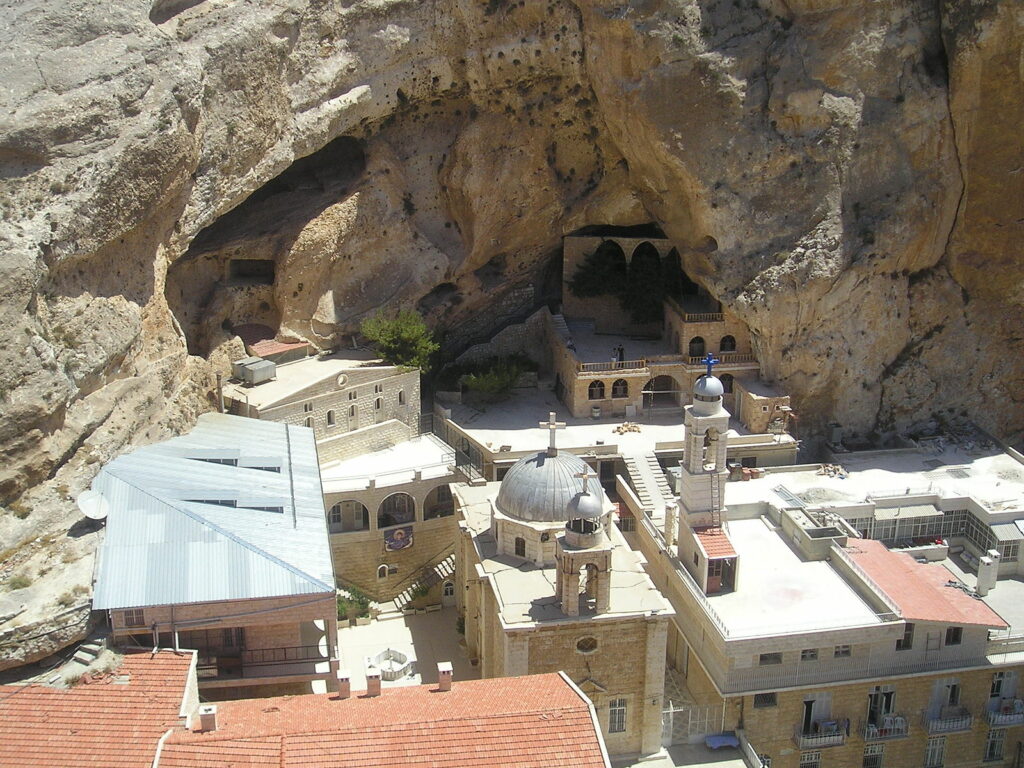
A village where the language Jesus spoke 2,000 years ago is still spoken today. Above, the stunning St. Thecla monastery in Maaloula, Syria, near the Syrian border with Lebanon. Maaloula is one of three villages in western Syria where a dialect of Western Aramaic, a direct descendant of the language spoken by Jesus, survives. Maaloula is directly across the Anti-Lebanon mountains from the city of Baalbek in the Beqaa Valley of Lebanon. In Lebanon, the ancient Syriac language — a form of Aramaic — is preserved by Maronite and Syriac Christians (image from Wikipedia)
Lebanon Report 2023, #6: Monday, July 3
An Ancient Tradition That Still Endures
By Christopher Hart-Moynihan, Director, Friends of Lebanon Project
Lebanon is “more than a country,” Pope John Paul II said in the 1980s (link). Lebanon is in fact “a message,” he said… and Pope Benedict XVI and Pope Francis repeated this judgment many times. Lebanon is a message of unity, showing the world how different faiths may live together in peace, even in the face of temptations to division and separation.
Lebanon, with its ancient Christian community, is also a message of continuity over time to the words and teachings of Jesus himself — a message that connects our modern world to the ancient faith, 20 centuries after Jesus lived and preached in this region of the world.
The message is in the very language of the faith: Aramaic
This message is preserved in the very language used by the Lebanese Maronite Church: Aramaic.
Lebanon has a deep historical connection to Jesus Christ. In his Gospel, Matthew tells us that Jesus traveled to the cities of Tyre and Sidon: “And Jesus went from thence, and retired into the coasts of Tyre and Sidon.” (Matthew 15:21) In Lebanon today, these two port cities, Tyre (Ṣur in Arabic) and Saida, are the two largest cities in the southern half of the country.
This means that Lebanon, along with modern-day Israel, Jordan, and Egypt, is part of the Christian Holy Land: the land where Jesus walked.
Lebanon maintains another, less well-known connection to Jesus. Lebanon is one of the few places in the world where one can still hear the words Jesus spoke, just as he spoke them. This is because here the ancient Aramaic language has been preserved into the modern era — even up until the present day.
Support for the Christians of Lebanon therefore means also support for the continued use of the language that Jesus spoke.
Here is a map showing, at the top, Byblos, Beirut, Sidon and Tyre, in the brown area marked “Phoenician States” — in the area of modern Lebanon. (The lake between Acre and Ashtaroth, colored light blue, in the area marked “Kingdom of Israel,” is the Sea of Galilee, where Jesus and his disciples lived and sailed in fishing boats, the light blue-colored area below Jericho is the Dead Sea):
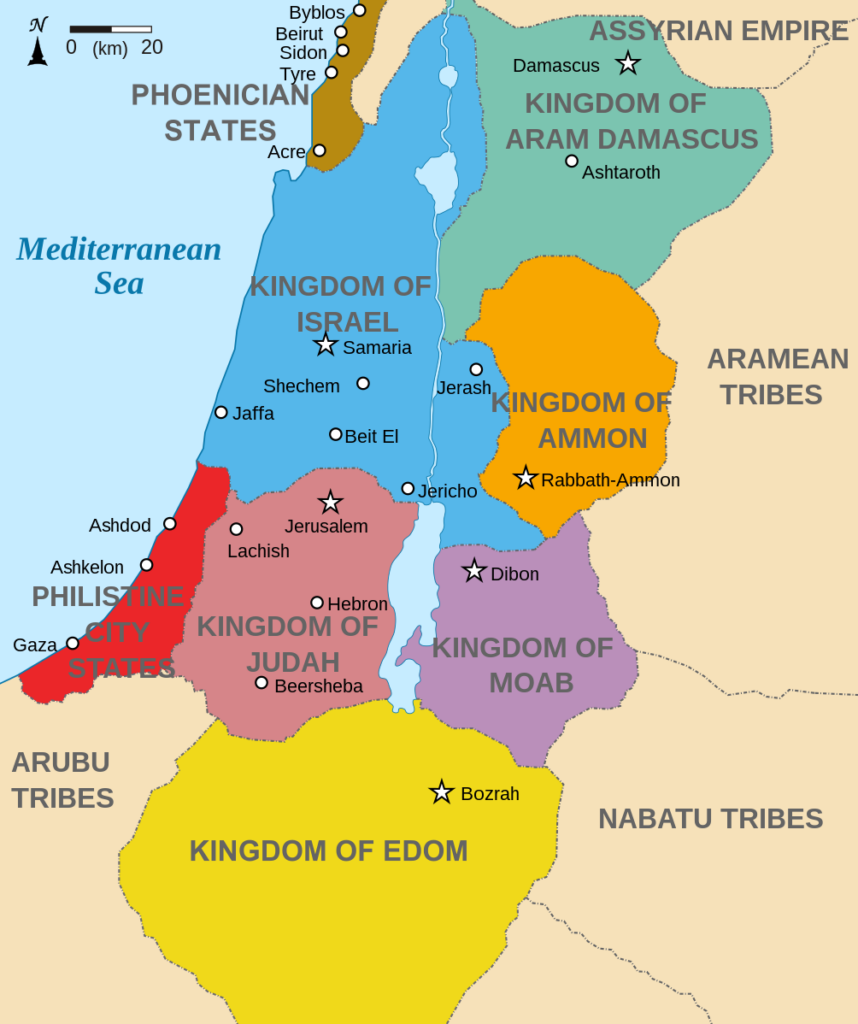
A map showing the kingdoms in the territories of modern-day Israel, Palestine, Lebanon, Syria, and Jordan, circa 1000 B.C. The kingdom of Aram Damascus, the ancient heartland of the Aramaic language, is to the north and east of Israel. The cities of Tyre, Sidon, Beirut and Byblos — all now part of modern Lebanon — are to the north and west of Israel, along the coast of the Mediterranean Sea. (image from Wikipedia)
A Brief History of Aramaic
Although Jesus was a Jew, and likely was familiar with both Hebrew and Greek, the language that Jesus and his apostles spoke, and preached in, was — like almost all other Jews of their time and place — Aramaic.
To understand this connection more fully, we must go back thousands of years, to a time long before the birth of Christ. In the Fertile Crescent, which stretches across modern-day Israel, Palestine, and Lebanon through Syria, southern Turkey, and Iraq, some of the world’s oldest civilizations arose, particularly around the cities of Uruk (southern Iraq), Nineveh (northern Iraq), Jericho (West Bank) and Damascus (Syria).
The languages spoken over the western half of this territory were Semitic, and in around 1000 B.C. various kingdoms were established, including the kingdom of Aram (centered on Damascus) and the kingdom of Hamath (centered on the city of Hama in modern-day Syria) where early forms of Aramaic were the principal language.
At around the same time, the ancient cities of Tyre, Sidon, and Berytus (Beirut) — centers of the Phoenician civilization and of modern-day Lebanon — were thriving.
Biblical scholars date the reigns of King Saul and King David in Israel to this time period as well.
The languages spoken in Aram, Phoenicia, and Israel during this period were Aramaic, Canaanite, and Hebrew: all Semitic languages, descended from one common ancestral tongue.
According to the Biblical record, the sons of Noah were said to be the forefathers of the Aramaeans, the Phoenicians/Canaanites, and the Hebrews. The Phoenicians/Canaanites were said to be descended from Noah’s second son Ham, while the Hebrews and Aramaeans came from separate branches of the descendants of Noah’s oldest (or possibly youngest) son, Shem. In fact, the book of Deuteronomy memorably describes Jacob as a “wandering Aramaean.”
Over the course of the millennium preceding the birth of Christ, the Aramaic language slowly spread until it was the lingua franca of the entire Middle East. Eventually it was adopted as a daily language even by the Hebrews and Canaanites/Phoenicians themselves. By the time Jesus was born, Aramaic and Greek (which spread gradually following the conquests of Alexander the Great around the year 330 B.C.) were the two dominant languages in the region.
Today, Lebanon is one of the few places in the world where Aramaic is still used. While most of the traditionally Aramaic-speaking lands have switched to Arabic over the past millennium, and Israeli Jews have revitalized Hebrew, Aramaic has survived as the language of the Middle East’s Christian minority.
Through our work, we wish to help preserve this ancient language.
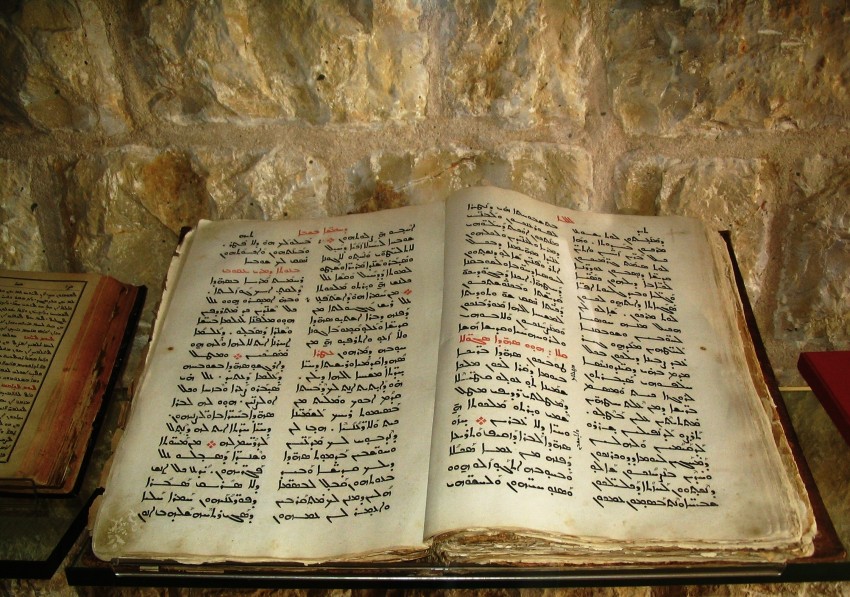
A prayer book written in the Syriac language, which is the liturgical language of the Maronite Church and several other sui iuris Eastern Churches. Syriac is a language that descends from the Aramaic spoken in the Eastern Roman and Byzantine Empires during the first millennium A.D.
What is the difference between Syriac and Aramaic?
The Aramaic language was so geographically widespread, over such a long period of time, that multiple distinct dialects developed. Several of these dialects are even so different from one another that they are not mutually intelligible.
In this sense we can see parallels with medieval Latin, whose spoken or “Vulgar” forms eventually became the modern Romance languages — Italian, Spanish, French, Portuguese, Romanian, and others.
The different Aramaic dialects were centered on the great metropolises of the Near East: Babylon, Nineveh, Damascus, and Jerusalem. Jesus and his disciples spoke Galilean Aramaic, one of the many dialects of Western Aramaic. In the centuries following the arrival of Islam, Western Aramaic gradually lost ground to Arabic in the Holy Land, Syria, and Iraq.
However, the Christian communities that did not convert to Islam continued to use Aramaic both as a daily language and as a liturgical language. Over the centuries of the first millennium A.D., the city of Edessa became a center of Christian culture, and the Aramaic dialect of Edessa was used in the Syriac Rite of the Mass as well as in many prayers and sacred hymns.
This dialect of Aramaic, which evolved organically in an unbroken tradition from the ancient Aramaic spoken by the peoples of the Old Testament and by Jesus Himself, is still in use today. It is known as the Syriac language, which is used by the Maronite Church and the Syriac Catholic and Orthodox Churches. So, roughly speaking, if Jesus spoke the Aramaic equivalent of Medieval Latin, what we are hearing when we listen to a Syriac Mass is akin to Modern Italian.
The first time I heard a service in the Syriac language was in Rome, at the Maronite Monastery in the Villa Serenella on the edge of the city. The chanting of the monks had a deep and meditative quality, and it was easy to imagine the Apostles and the early Christians praying in a very similar way.
And now, the beauty of this ancient language and its liturgical and musical tradition is, thankfully, becoming more and more accessible to Christians (and non-Christians) worldwide. In October 2016, Pope Francis was greatly moved upon hearing a choir sing an Aramaic psalm during his trip to Georgia (Click here to watch a video of the hymn with remastered audio).
During our Friends of Lebanon pilgrimage to Lebanon this September, we will be able to listen to the ancient hymns of the Maronite Church, sung in Syriac. Please consider joining us as we go in search of the ancient traditions that will help bring unity in a time of crisis. More information on the Friends of Lebanon pilgrimage can be found below.
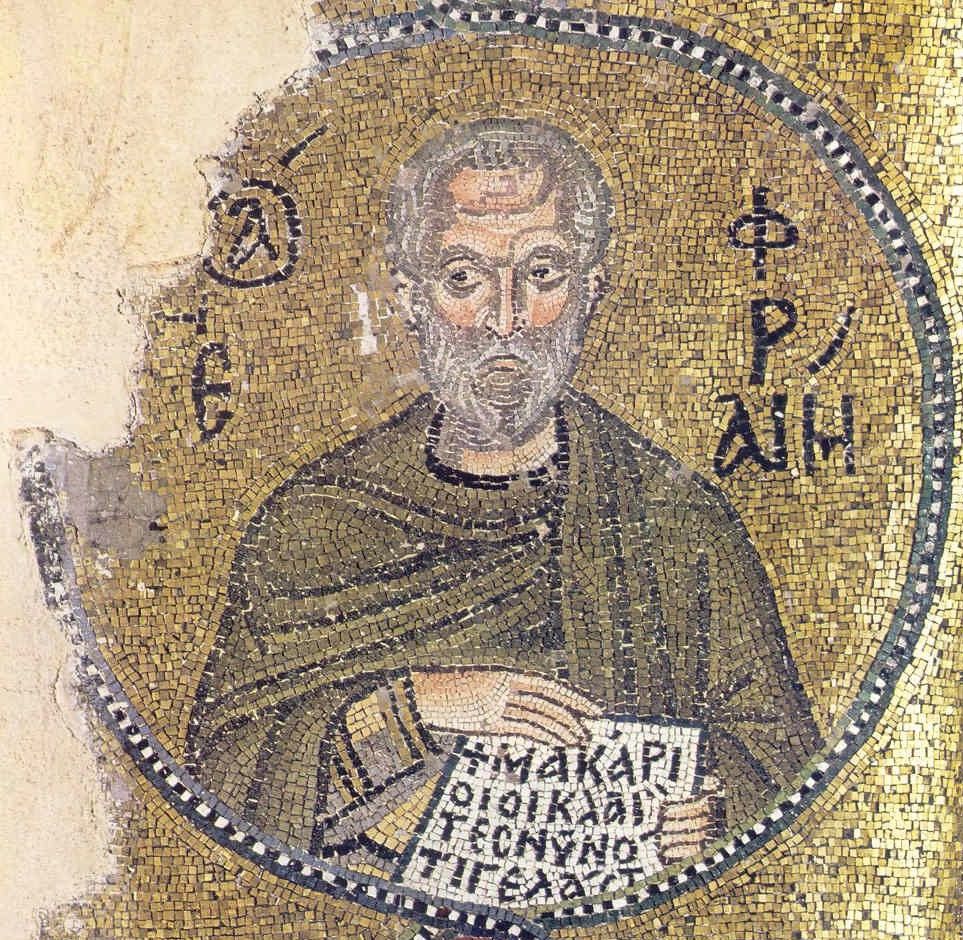
Ephrem the Syrian, mosaic in Nea Moni of Chios, Greece (11th century) (image in public domain taken from Wikipedia)
Saint Ephrem: The Greatest Hymn Writer of Eastern Christianity
I would like to conclude this discussion of the Aramaic language and its link to the modern Maronite and Syriac Churches with a few words on St. Ephrem, who wrote many of the hymns that are used in the Syriac liturgy.
St. Ephrem, known as Ephrem the Syrian, was born in the city of Nisibis (modern-day Nusaybin in southern Turkey) around the year 306 A.D. During his life, he became known as one of the greatest writers in the language that we now call Syriac. More than four hundred of his hymns have survived to the present day.
In a 2012 article written shortly after the outbreak of the Syrian Civil War, Prof. Joseph Amar of Notre Dame University reflects on the unique Eastern Christian tradition that St. Ephrem both drew deeply from and greatly enriched:
It is ironic that the Semitic cultural and linguistic context of early Christianity has been so thoroughly obscured. Jesus, after all, was an Aramaic-speaking Jew, and many early converts to Christianity spoke Syriac, a form of Aramaic which diverges only superficially from the Aramaic spoken by Jesus. Through the fourth century, this distinctly Semitic expression of Christianity remained largely untouched by the influence of classical philosophy that dominated Christian thought in the West.
Aramaic is widely associated with the Bible and the Dead Sea Scrolls, but its role as a Christian language with a rich literary tradition of its own is rarely acknowledged. Building on the literary legacy of its origins in Judaism, native Syriac Christianity produced an enormous body of literature that articulated a distinct understanding of the faith, all in the Syriac dialect of Aramaic. By the fourth century the stage was set for an explosion of creative energy that was ignited by the Christian poet and teacher Ephrem the Syrian.
Today Ephrem is not quite the obscure figure he once was, thanks to a growing number of translations of his works into modern Western languages. He was born early in the fourth century in the northern Mesopotamian city of Nisibis (modern Nusaybin), the center of a thriving Jewish community that boasted a prominent rabbinic school. He died in 373 in Edessa (modern Şanliurfa). Today both cities are in Turkey. (Edessa’s earliest Syriac speakers called it Urhai, believing it was the Ur mentioned in the Bible as the birthplace of Abraham.)
Ephrem is one of the fathers of the church, scholars so named for their contributions to the articulation of Christian faith during its formative period. Though few would contest his inclusion among these luminaries, little that pertains to this mostly Greco-Roman company prepares us for him. Grounded in the classical curriculum, the fathers wrote in Greek and Latin, and used the abstract language of philosophy to shape the central beliefs of the faith.
Ephrem, on the other hand, was a Semite who wrote exclusively in Syriac; and while he shares some of the theological concerns of his contemporaries who wrote in Greek and Latin, there is a crucial difference that goes well beyond language. What sets him emphatically apart from the mainstream Christian authors of his day is his utter abhorrence of rationalism — “the poison of the Greeks,” as he called it. For Ephrem, abstract philosophical language and cleverly constructed epistemologies had no place in theology. Divine truth, like life itself, required a subtler, more comprehensive language. Only poetry was sufficiently allusive to intimate the truths of God.
Ephrem gave voice to ancestral memories that identified Syriac Christians with a shared history. His poetic compositions found a permanent place in the liturgy, where they sustained a common cultural memory that coheres to this day among Syriac Christians. This common identity continued to be affirmed even in the wake of theological controversies that ravaged Syriac Christianity in the century following Ephrem’s death.
[End, Prof. Joseph Amar on St. Ephrem. Link to full article here.]
News
Sectarian Dissent as Hezbollah Withdraws from President Voting
June 14th marked another setback for Lebanon. The nation’s Parliament failed, for a 12th time, to elect a President, during a fractious session that brought the country’s sectarian divisions into stark relief.
What was particularly dispiriting about the failure of the Parliament was that in recent weeks there had been widespread hope that Jihad Azour, a former Minister of Finance, had the votes to be selected as Lebanon’s next President.
The voting process itself was fairly dramatic. After the first round of voting, in which Azour received 59 votes, well short of the 86 needed to gain the presidency, the Parliament prepared for a second round of voting.
In the second round of voting, according to Lebanon’s laws, only 65 votes are needed to select a President, so it seemed that Azour possibly had a path to victory.
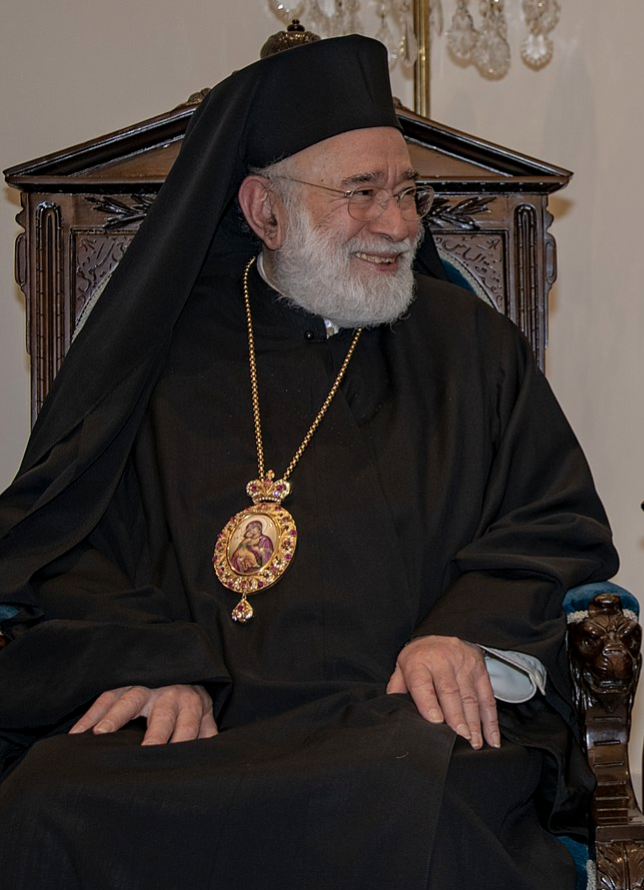
Bishop Elias Audi, the Greek Orthodox Archbishop of Beirut (Antioch Patriarchate), who criticized Lebanon’s leadership in a recent sermon (public domain image taken from Wikipedia)
However, before the second round of voting, Hezbollah, the Iran-backed Shia-dominated party and paramilitary organization, withdrew from the session, along with their allies, the Amal Movement. As a result, 27 representatives left the chamber, leaving it without a quorum to begin the second round of voting. Nabih Berri, Lebanon’s Speaker of the Parliament and a political ally of Hezbollah, ended the session. Berri is the leader of the Amal Movement.
Subsequent to the Lebanese Parliament’s latest failure to elect a President for the nation, Patriarch of the Maronite Church Bechara Boutros al-Rahi (Patriarch Rai) blasted the country’s leaders. The Patriarch stated that the Parliamentary session had been “a farce” and that Lebanon’s political system had been violated “in cold blood.” Patriarch Rai had traveled at the end of May to the Vatican and France in order to shore up international support for Azour’s candidacy
Elias Audi, the Orthodox Archbishop of Beirut for the Greek Orthodox Patriarchate of Antioch, echoed Patriarch Rai’s criticism in his Sunday sermon on June 18th. Bishop Audi did not explicitly name Amal or Hezbollah, but he stated that those who had withdrawn from the session appeared “uninterested” in Lebanon.
A Call From Victoria Nuland…
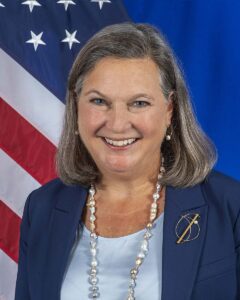
Victoria Nuland, U.S. Undersecretary of State for Political Affairs (public domain image)
Several days before the failed presidential vote of June 14, Berri had spoken by phone with Victoria Nuland, the current Undersecretary of Political Affairs for the United States.
A State Department spokesman, Matt Miller, said that the two had had a “constructive conversation” and that Nuland had thanked Berri for his willingness to try to maintain a quorum so that the vote could be held.
Miller also stated that the two had discussed the need for Lebanon to pass “meaningful” legislation in order to be able to receive financial support from the International Monetary Fund.
While asserting that the current U.S. administration does not endorse any particular candidate (the two main candidates are currently Azour and Suleiman Frangieh, the preferred candidate of Hezbollah), Miller stated “We remain committed to Lebanon’s sovereignty as we press the country’s leadership to adopt a sense of urgency in meeting the critical needs of the Lebanese people, starting with the selection of a president.”
Nuland is perhaps best known for her presence at the Maidan Square Revolution in Ukraine in January 2014, where she took a proactive role in choosing candidates for the incoming Ukrainian government on behalf of the United States. It remains to be seen whether she or other members of the Biden Administration will eventually try to take such a hands-on approach with Lebanon.
Meanwhile, other voices in American foreign policy circles issued statements expressing their concern over the latest political setback. U.S. House Representatives Darrell Issa, Darren LaHood, and Debbie Dingell, all members of the U.S.-Lebanon Friendship Caucus, wrote a letter to Secretary of State Anthony Blinken calling for “more serious measures” to be taken if a President is not elected, stating, “The United States has a strong interest in a stable, independent Lebanon. Unfortunately, the presidential vacancy stands in the way of such cooperation.”
President of the American Task Force on Lebanon Ed Gabriel expressed similar sentiments in his own statement: “We’re pleased to hear that [Nuland] has talked to Speaker Berri and emphasized the need, not only to call for a session to elect a new president but furthermore, called for him to keep the session open until a president is elected.”
…and a Visit From a Special Envoy from France
Following the failed vote on Monday, June 12, a former top French diplomat was sent by the Emmanuel Macron administration to meet with Lebanon’s top leaders. Jean-Yves Le Drian, who served as the Minister of Europe and Foreign Affairs (2017-2022) as well as the Minister of Defense (2012-2017) visited Beirut on June 14-15.
During Le Drian’s time in Beirut, he met with Nabih Berri, the Speaker of Parliament, on June 14, and with Prime Minister Najib Mikati and Patriarch Rai on June 15.
Regarding the specific goals of his visit, Le Drian stated, “I don’t come with any options. I want to listen to everyone,” adding that “the solution must come first from the Lebanese.”
Le Drian received criticism from all sides of the political spectrum before, during and after his visit. The journal Al-Akhbar, generally aligned with Hezbollah, wrote that there were “no high hopes” for Le Drian’s visit. Meanwhile, the Christian Front, released a statement urging him not to allow France to support the candidacy of Suleiman Frangieh:
“The Christian parties who will meet with Le Drian should send him a clear message, which is that the interests of the Lebanese people and Lebanon’s sovereignty are above the economic interests of France and Iran,” stated the Front. “France must return to playing its historical role as a caring mother for Lebanon and its people, otherwise it will become an enemy state for the majority of Christians and Lebanese if it continues to support a candidate that is rejected by the majority of Christians.”
St. Charbel: “God is Love, A Love that is Eternal”
Below I continue the homily of St. Charbel that that I shared with readers in last month’s report (link to last month’s report here, all previous Lebanon Reports available on our website here). The homily is entitled “And You Will Achieve the End for Which You Were Created”.
Our group, the Friends of Lebanon, believes that St. Charbel is a truly unifying figure who is capable of healing Lebanon’s fractious religious and political divides. That is why we continue to return to his words in these reports.
Every human being is a flame created by our Lord to enlighten the world. Every human being is a lamp made by him to shine and to give light. Someone who obtains a lamp does so in order to light up the darkness. A lamp is made to illuminate darkness.
But these lamps, human beings, are interested only in their appearance: they color their glass panes, cover them with ornaments, whereas God created them plain and transparent so as to protect and propagate the light. They have become thick and hard to the point of hiding the light, and the world remains plunged in darkness.
These lamps that our Lord made to be bearers of light to the world turn themselves into works of art, embellished and tinted but without light. What good is a lamp that does not light up the darkness? You cannot see a lamp in the darkness unless it is lit.
Whatever the beauty of the lamp may be, its light is even more beautiful. The world is going to ruin in the darkness; be its light. Make your glass panes thin and transparent again so as to light up the world and to achieve the purpose for which God created you.
Our Lord has in store a purpose that each creature must fulfill through its life. Contemplate all the creatures on the earth and you will find that each one of them does its work precisely and honestly; not one of them is miserable.
The most miserable creature on earth is surely happier than a sinful human being who, at the moment of judgment, stands shamefaced before the grandeur of God’s love: this love that created the universe, that gave life, is the only treasure piled up that will last so as to accompany you into the next world.
All your treasures, your money, and your accomplishments that you think you possess here below, even your bones, will not belong to you anymore.
He who appears before the Lord, empty of love, will die of shame. That is his true death and not the moment when he gives up his soul.
If a human being is not transformed by love, he dies, for God is love, a love that is eternal. Let him fill your hearts and let humility govern your minds. Pray and be converted. Pray to Jesus Christ, he will hear your prayer; open your hearts to him, he will enter in and give you peace. Pray from the bottom of your hearts without ceasing.
Do not bother to search for the truth far from Christ; no truth exists outside of him. Christ is the only truth. When you know Christ, you will know the truth and you will be free. Christ wants you to be free. Have no fear, take courage; know that Christ has conquered the world.
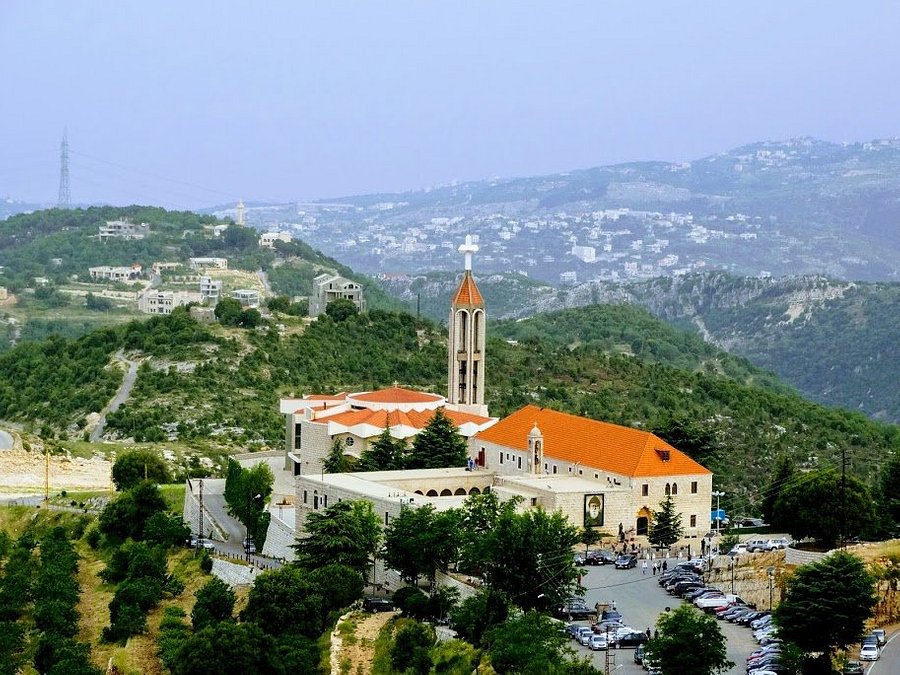
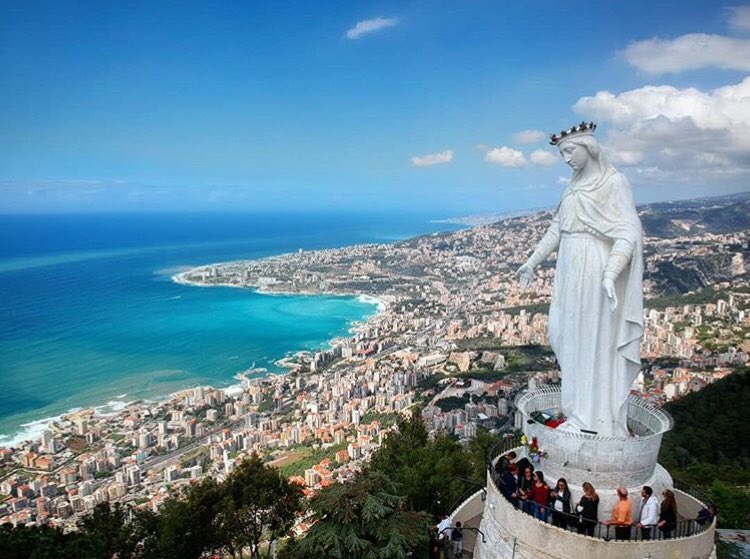
In the Footsteps of St. Charbel: Our September Pilgrimage to Lebanon
I would like to invite you to join us on our 2023 Inside the Vatican Pilgrimage to Lebanon!
Lebanon is a small, beautiful country of seacoasts (see the above photo of the coastline north of Beirut), hills, mountains and rivers, and majestic cedar trees that has a history stretching back thousands of years, to the Phoenicians and the invention of writing itself in the city of Byblos.
Tucked in between Syria and Israel, the country is a crossroads between Asia and Europe, between the Christian, Muslim and Jewish worlds. Christians have been here since the very beginning, and the Maronite Catholics are a treasure in the global Catholic community.
Many have reflected on the unique situation and mission of the country as a special place of dialogue and living together which deserves to be supported and protected.
Our trip is not only a pilgrimage to holy places and shrines, but also a time for us to go within, toward one place only — toward the heart of God, to that place where we find our own personal unity with Him.
Our itinerary is a living itinerary. Each day could present unexpected encounters. Our prayer and hope is that we allow the Holy Spirit to be our guide.
Come with us to Lebanon to encounter this ancient land where Jesus walked and to meet modern day saint!
Friends of Lebanon Scholarships
Over the past two years, our Friends of Lebanon initiative has brought “short-term help” and “long-term hope” to numerous families and individuals in need. Over the course of 2021 and 2022, and on into 2023, we have focused on supporting education, so that promising young people may build their future in Lebanon.
Through your support, we have assisted 132 students as they pursue their education. But we need continued support to keep them afloat.
I am always moved by the resilience and determination that each of these young people has to stay the course and continue forward while their country is in crisis. Please help us support them here.
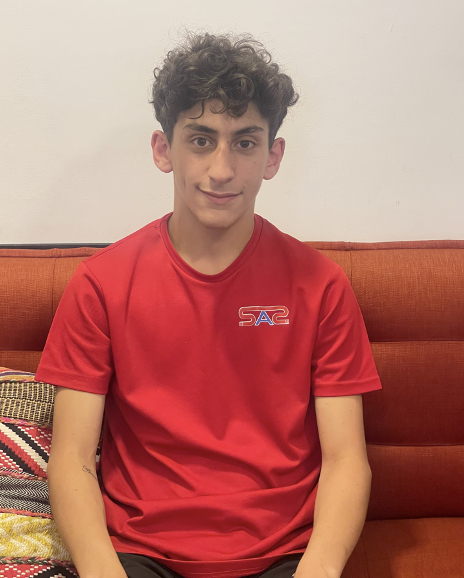
Rawad
Rawad is a BT1 student (Baccalauréat Technique is the vocational and technical education system in Lebanon. BT1 is equivalent to 9th grade). He is also a Division 2 basketball player with the Lebanese national team. He is 16 years old.
Rawad’s father is a carpenter and makes a minimal salary. Rawad’s mother is taking care of Rawad and his two siblings. The family is sometimes struggling to put food on the table.
Rawad’s goals are to become a professional basketball player and a physical therapist.
Alain

Alain is passionate about sports and trains with one of Lebanon’s most elite track and field clubs. Alain has had a passion for track and field, his favorite sport, since he was very young. At the recent Lebanese U18 and U20 national championships, Alain garnered multiple medals for his athletic performance.
Recently, however, Alain began to miss more and more of his training sessions. This was very uncharacteristic behavior, as Alain is generally extremely disciplined, organized, and excited to train. After several inquiries, his club found out that he was working full-time as a personal trainer in order to earn the money necessary to pay his school fees.
Alain’s father is unemployed and his mother makes a very minimal salary as a nurse. He has an older brother who is also in need of support.
Alain is known for his big heart. In 2022, he assisted the Friends of Lebanon and our partners in Beirut, Lebanese Young Talents, in distributing the H2Go water purifiers to families in need in Beirut.
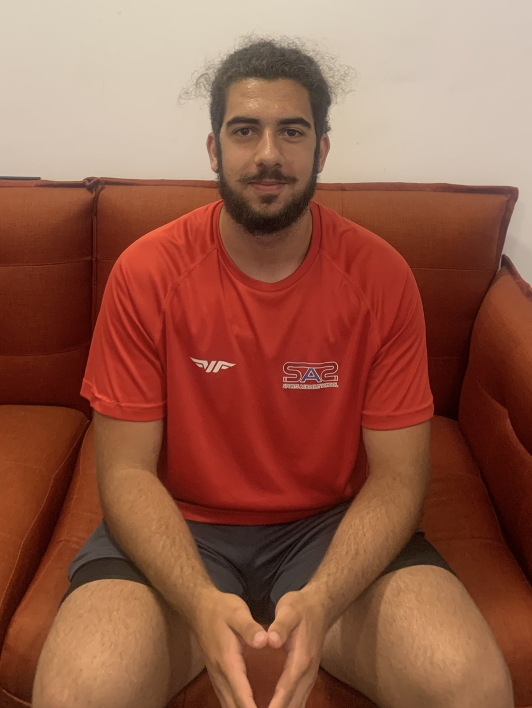
Jad
Jad is a kind and intelligent young man with big dreams. He loves sports and hopes to have the opportunity to continue his higher education in France. Jad is currently studying at the BT2 level (Baccalauréat Technique, equivalent to 10th grade). He has also passed the French DELF exam, a French proficiency exam that is required for all those who wish to apply to schools and universities in France.
Jad’s parents have a range of health issues. His mother is unemployed and his father is a taxi driver. Because of the family’s financial struggles, Jad has applied for financial aid. He will continue to need financial aid while he completes his secondary studies in Lebanon.
Please consider becoming a “Friend of Lebanon,” and help us to bring “short-term help” and “long-term hope” to the land where Jesus Christ walked and performed miracles.
As a “Friend of Lebanon,” you will be able to participate in our Zoom calls with the people we are working with in Rome, Beirut, and throughout Lebanon to support Christians in their ancient homeland.
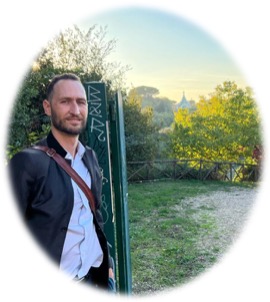 Please consider joining us.
Please consider joining us.
Christopher Hart-Moynihan
Director of Programs
Urbi et Orbi Communications
Enjoy a complimentary digital edition of Inside the Vatican Magazine by clicking here.
You can view all of our previous Lebanon Reports by clicking the button below. Please share with your friends and loved ones.

